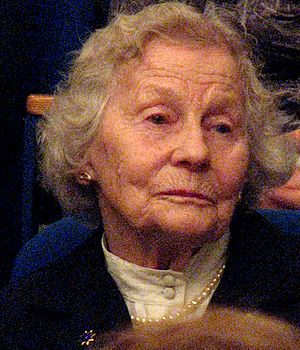Heli Susi facts for kids
Quick facts for kids
Heli Susi
|
|
|---|---|
 |
|
| Born | 14 November 1929 Tallinn, Estonia
|
| Died | 8 June 2020 (aged 90) |
| Nationality | Estonian |
| Occupation | Teacher and translator |
| Spouse(s) | Olev Subbi (divorced) |
| Parent(s) | Arnold Susi Ella Adelgunde Roost |
| Relatives | Heino Susi (brother) Arno Susi (brother) |
Heli Susi (born November 14, 1929 – died June 8, 2020) was an Estonian teacher and translator. She is known for her brave actions during the Soviet era. She helped hide important writings from a famous Russian author.
Early Life and Challenges
Heli Susi was born in Tallinn, Estonia. She was the youngest child of Arnold Susi and Ella Adelgunde Roost. Her father, Arnold Susi, was an important government official in Estonia. He was the Minister of Education during World War II.
After Soviet troops took over Estonia, her father was arrested in 1945. He was sent to a "gulag," which was a very harsh Soviet prison camp. In 1949, Heli, her mother, brother Arno, and grandmother were also forcibly moved. They were deported by Soviet authorities to Siberia, a cold region in Russia.
In Siberia, they were forced to work as laborers. The family was finally reunited with Arnold Susi in 1954. While in Siberia, Heli met and married Olev Subbi, who was also an Estonian deportee and an artist. They had a son named Juhan. The family was allowed to return to Estonia in 1958.
Career and a Secret Mission
After returning to Estonia, Heli Susi studied the German language at the University of Tartu. She later became a translator. She also taught German at the Tallinn Conservatory, a music and theater school.
Because of strict rules, her family could not live in big cities. They lived in a smaller area near the village of Vasula. Heli's father, Arnold, had met a famous Russian writer named Aleksandr Solzhenitsyn in prison.
After Solzhenitsyn published his first book, the two men reconnected. In 1965, Soviet secret police (KGB) took many of Solzhenitsyn's writings. But he secretly gave an unfinished book to Arnold Susi. This book was called The Gulag Archipelago.
Over two winters, from 1965 to 1967, Solzhenitsyn finished writing this book in Estonia. He stayed at the Susi family's home. To keep it a secret, the family told neighbors that Solzhenitsyn was a professor from Moscow.
Heli Susi played a very important role. She was the guardian of the secret writings. She hid them in different places around Estonia. She hid them by the Ahja river, in a friend's linen closet, and in a house basement.
Solzhenitsyn later included Heli Susi in his book. He called her one of the "witnesses of the Archipelago." These were people whose stories helped him write the book. He thanked them for their help in keeping his work safe.
Awards and Legacy
Heli Susi received several honors for her work and courage.
- She was made an Honorary Member of the Estonian Students' Association.
- She received the Order of the National Coat of Arms, IV Class, in 2011. This is a high honor in Estonia.
- She was made an Honorary Member of PEN International in 2018.
In 2019, the Estonian Ministry of Justice created a special award. It is called the Heli and Arnold Susi Mission Award for the Courage to Speak Out. This award honors people who bravely use their words to support human rights and freedom.

